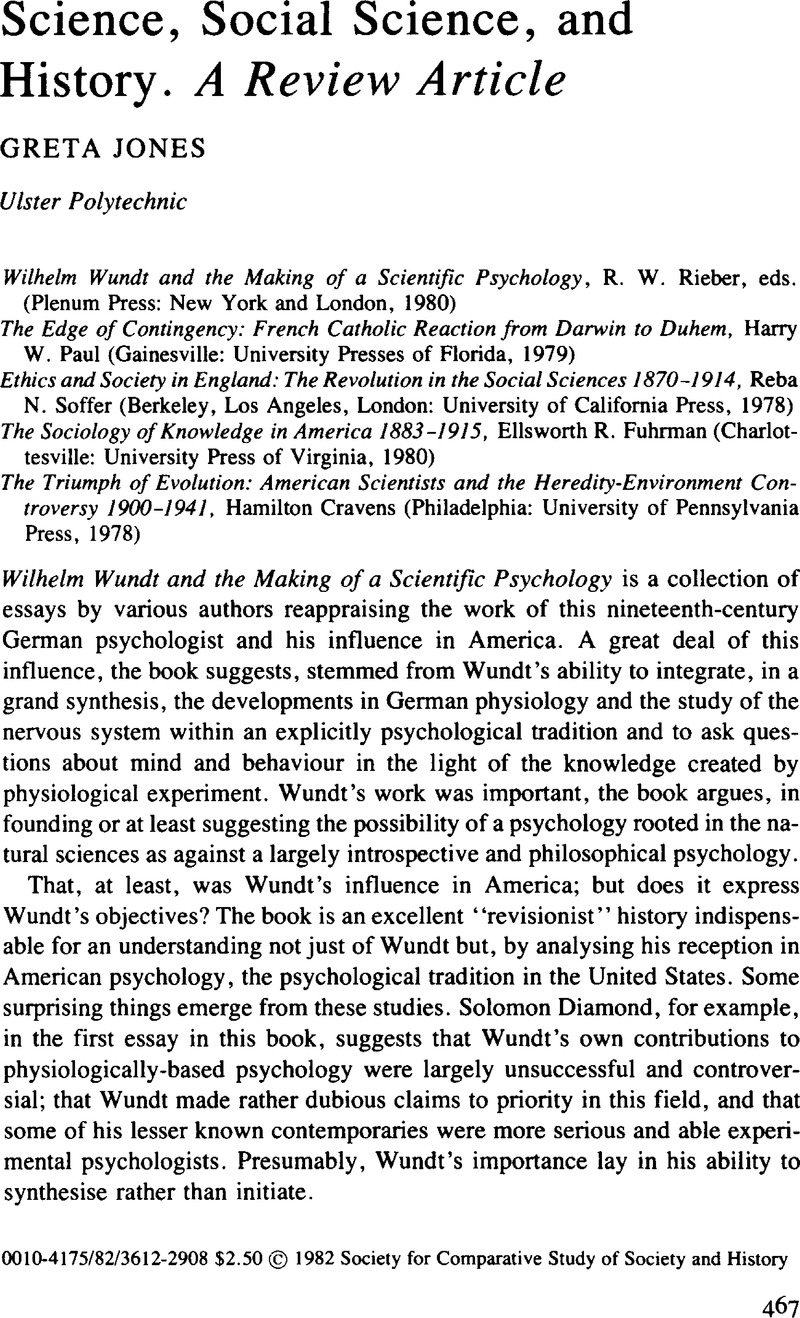Published online by Cambridge University Press: 03 June 2009

1 Rieber, , p. 79.Google Scholar
2 Rieber, , p. 43.Google Scholar
3 Ellegard, Alvar, Darwin and the General Reader, 1859–72 (Universitetarsskrift Goteborg, 1958).Google Scholar
4 Moore, James R., The Post Darwinian Controversies (Cambridge: Cambridge University Press, 1979).CrossRefGoogle Scholar
5 Austin and London: University of Texas Press, 1974.
6 Paris, 1974.
7 Paul, , p. 45.Google Scholar
8 See Letter from Wallas to Shaw, 1921 undated, Shaw Papers, British Museum ADD MSS. 50553.
9 Romanes and Mivart, for example, were contemporaries of Darwin. They did not seek to reinject consciousness into evolution because of the “new” philosophy but for religious reasons which for many people of similar views preceded and survived the arrival of the new ideas in biology. They may have recognised in this new philosophy—as James did—similar objectives. But as frequently they were formed in a different and distinct tradition.
10 Soffer, , p. 18.Google Scholar
11 Soffer, , p. 19.Google Scholar
12 Ritchie, D. G., “Professor Green's Political Philosophy,” Contemporary Review, 1887, Vol. LI, 1887.Google Scholar
13 See Stephen, Leslie, “An Attempted Philosophy of History,” Fortnightly Review, (New Series), Vol. XXVII, 1880.Google Scholar
14 Soffer, , p. 71.Google Scholar
15 Bosanquet, Bernard, Socialism and Natural Selection. Aspects of the Social Problem (London: MacMillan, 1895).Google Scholar
16 See Bain's, Alexander criticism of phrenology, On the Study of Character including an Estimate of Phrenology (London: Parker, Son & Bourn, 1861)CrossRefGoogle Scholar, London, 1861. Many of Bain's structures applied to the kind of psychology promoted by Galton. Galton was aware of this; see Hereditary Genius (London: MacMillan, 1869), 2.Google ScholarPubMed
17 See Marshall, A., The Economics of Industry (1879), 2nd ed. (London: MacMillan, 1881). p. 31;Google ScholarPubMedThe Principles of Economics, 1890–1907, 8th ed. (London: MacMillan, 1947), p. 201.Google Scholar
18 One of the most prominent eugenicists Karl Pearson was also the author of The Grammar of Science, 1889, frequently quoted as part of the “new” philosophy in histories of this period.
19 Maclntyre, Alaisdair, ‘John Stuart Mill's Forgotten Victory,’ London Review of Books, 16 0ct.-5 Nov., 1980, p. 14.Google Scholar
20 For Fisher's, R. A. role see Jones, Greta, “Eugenics and Social Policy Between the Wars.” The Historical Journal (Forthcoming, 1982).Google Scholar
21 L. T. Hobhouse was of course both a prominent British sociologist and a critic of eugenics. However, he counterposed to eugenics his own biologically orientated sociology. For other evidence for the importance of biology in English sociology, see Jones, Greta, Social Darwinism and English Thought (New Jersey: Humanities Press, and Brighton: Harvester, 1980)Google Scholar. In addition, criticism of mental testing in 1930s in Britain tended to note the cultural arguments in favour of technical criticisms; see Gray, J. L. & Moshinsky, Pearl. Ability and Opportunity in English Education, chapter VIII in Hogben, L., ed., Political Arithmetic (London: Allen and Unwin, 1938). For some of the same reasons as in America, this changed in the 1940s and 1950s.Google Scholar